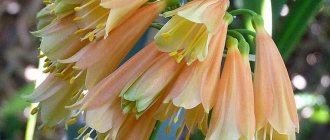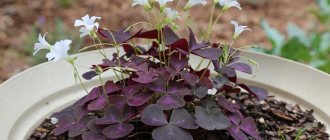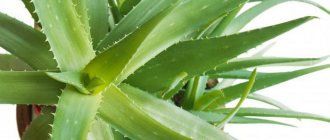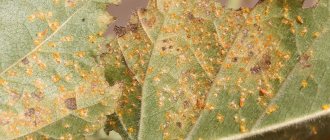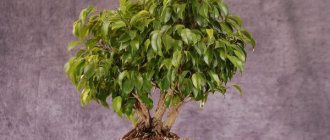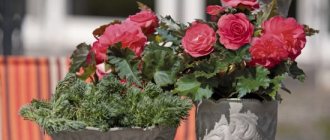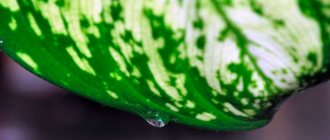Flowers that are not recommended to be kept at home because of their energy
Superstitious people believe that there are plants that, according to popular belief, should not be kept in an apartment. They emit negative energy. Household members' health and mood deteriorate. Sometimes financial problems arise. Flowers that are best avoided to maintain home well-being:
- Sansevieria;
- begonia;
- ivy and other indoor creepers;
- cissus;
- scindapsus.
On a note!
Cacti are plants with controversial effects on others. It is believed that they cannot be grown in the bedroom, as they take away strength from men. But at the same time, cacti are able to attract negativity. Therefore, it is recommended to grow them in pots in other rooms of the house where there is a computer.
Pike tail
Sansevieria is one of those flowers that bring misfortune to the house. Growing it in an apartment, according to popular belief, is a bad idea. This plant is also called “mother-in-law’s tongue.” The energy of a flower brings discord into relationships and prevents them from being harmonious. Therefore, it is not worth keeping it in the house where the newlyweds live.
Ivy
According to signs, this house plant cannot be grown in an apartment. It attracts troubles and misfortune. Unmarried girls are especially not advised to keep ivy. According to legends, it is classified as a “husband flower.” But outside the home, climbing crops protect against problems.
Scindapsus
The plant is also classified as a house flower, which is recognized as a "husband". Scindapsus, or “devil’s ivy,” not only scares away potential suitors, but also provokes quarrels in an already established family. It cannot be planted in the house. It can force the husband to leave and contributes to conflicts with relatives.
Cissus
This is a tropical plant, which, due to the shape of the foliage, is also called the “birch” flower. It is often used by designers for room decoration. However, cissus has extremely unpleasant negative properties:
- It sucks a person's vitality, which leads to frequent illnesses.
- Like other loaches, it is credited with “husband-mongering” properties.
- Pregnant women should not be near cissus. According to legends, the umbilical cord can wrap around the neck of an unborn child.
- In the old days it was believed that if you fell asleep next to it, it could strangle a person.
On a note!
Such superstitions are the result of the vine’s resemblance to a snake and the negative characteristics that were attributed to them.
Adenium
Most of the signs and superstitions associated with adenium are associated with the properties of this plant. Beliefs say that this “desert rose” should not be kept in the house due to health risks. The plant is poisonous. Its juice can penetrate the body through the pores and cause serious intoxication.
Caution required
The list of not the most useful plants needs to be supplemented. Some are not particularly dangerous. But under certain conditions they can cause harm.
List:
- Lily releases a lot of carbon dioxide at night. It is prohibited to keep in the sleeping room.
- The fern also “breathes” in the dark. Your head will hurt in the morning.
- Ficus is harmful to allergy sufferers.
- Hydrangea is too fragrant. Over time, it provokes the development of allergies.
- Tuberose is contraindicated for heart patients and hypertensive patients.
- Geranium can cause an asthma attack.
- Crassula contains arsenic. An overdose during treatment impairs consciousness.
- Dracaena is slightly toxic. It is advisable not to eat it.
Plants that are recommended to grow indoors
The opinion that every home must have plants is due to their properties. They release phytoncides and emit positive energy. If you take care of them and place them correctly in the interior, they will attract good luck, prevent conflicts and decorate your home environment.
Chinese rose
These flowers bloom very beautifully, which is why many housewives love them so much. There are many superstitions associated with the Chinese rose in the home. Hibiscus should be grown for girls who want to get married, and for older women - for rejuvenation. For spouses - to add to the family or to add new passion to their relationship.
Crassula
This Crassula succulent attracts wealth to the home. Because of the coin-like appearance of the leaves, the plant is called the “money tree.” In order for the fat plant to improve the financial situation of the family, it must be grown in a red, black or green container, and 2-3 coins should be placed at the bottom of the pot. Ideally, you should not buy such succulents, but pinch off a shoot from rich people.
Crossandra
This plant is an indicator of places with negative energy. Because of this, the crossandra is often placed near the bed. When it starts to hurt and gradually dies, you need to move the bed to another place. If a flower in your house constantly withers, you should think about changing your place of residence.
Spathiphyllum
It is also called “women’s happiness” and is offered to grow for those who are single and want to get married. If you place spathiphyllum in the house, a loving person will soon appear there. Mutual understanding will improve in the family. Spouses who have wanted to have children for a long time will soon have them.
Anthurium
This indoor plant is also called “male happiness.” Anthurium attracts good luck to a man, ensures peace of mind and helps to quickly find his beloved. It is recommended to place it in the marital bedroom to bring back the faded passion in the relationship. At the same time, anthurium helps fill the home with positive energy.
On a note!
Anthurium is a paired indoor flower for Spathiphyllum.
Haworthia
This plant is considered the protector of happiness in the home. They say that haworthia, like an anchor, holds positive energy. Such flowers do not grow and remain small. And if the haworthia begins to get sick, fade and gradually die, this indicates a difficult atmosphere in the house.
Epiphyllum
Popular superstitions say that this plant acts as a “guard” against troubles at home. If it blooms, this is a sign of an imminent addition to the family. And if the florist is lonely, he will soon meet his love. But you cannot give or give away epiphyllum. It prevents unmarried girls from finding a groom and also leads to separation.
Roses
Roses create a good atmosphere in the house, and when the flower is red or pink, then if you make a garland of 32 petals and place it above the marital bed, this will help you have children. But only those flowers that have been growing in the house for at least a year are suitable for this. Rose is a good indicator of relationships. If the plant begins to wither for no reason, this signals imminent family problems.
Oxalis
Oxalis, or four-leaf oxalis, is considered a symbol of good luck. It is often scammed by single women to find a mate. If oxalis grows in the home of spouses, it helps them maintain good relationships and keep family ties strong.
Calathea
This plant is considered the guardian of marriage bonds. Calathea protects spouses from troubles and conflicts, helps their relationships be harmonious. With his appearance in the house, studies go better, and there are fewer family disagreements. Older people feel younger. It gives confidence and firmness to actions. But this flower cannot be thrown away. Otherwise, he will leave all the negativity collected earlier in the house.
Pachira
Pakhira endows those living in the house with health, wealth and luck and protects the home from troubles. This tree cannot be given or transferred to anyone. In this case, all other flowers in the house will not be able to bloom. If you still need to give the flower, then take a coin or some other thing in return.
Nolina (bocarnea)
This unusual-looking indoor palm tree brings positive changes to the lives of those who grow it. Due to its bizarre shape, reminiscent of an elephant’s leg, the flower has gained popularity among gardeners. It suppresses unreasonable outbursts of anger and aggression. Therefore, it is recommended to place it in rooms where many people gather. There the positive influence of the flower will be most pronounced.
Dicentra is magnificent
Due to its specific appearance, this flower is called “broken heart”. Dicentra magnificent has a positive effect on a person. By placing it in the room, a guy or girl who wants to find their lovers will do it faster.
On a note!
There are many romantic legends about dicentra, in which it helps people find their love.
Gloxinia
Gloxinia is important for the atmosphere of the home. It has a positive effect on family relationships. When the flowers are blue, they help develop a person's creativity. Red or pinkish shoots distract from everyday and financial problems. White blooming gloxinia cleanses the house of negativity. And purple has a calming effect and helps prevent minor quarrels.
Bougainvillea
Bougainvillea will bring wealth and prosperity to your home. This container plant also helps people achieve career heights and become successful in life. At the same time, bougainvillea is credited with the properties of a “protector”. According to legends, this flower protects from ill-wishers and envious people.
Harmful house plants
1. Philodendron
Philodendrons are many people's favorite houseplants.
Perhaps this is one of the most popular house plants. The advantages of the flower are obvious: it has an attractive appearance, grows quickly and is not particularly whimsical.
But while this plant is a perfect addition to any room, it contains calcium oxalate crystals, which are toxic to humans and animals.
Philodendrons can be climbing or non-vining. It is very important to keep climbing plants hanging out of the reach of children or pets, and to trim leaves and tendrils regularly.
Non-climbing plants should be stored on high window sills or shelves so that children or animals cannot reach them.
Side effects in humans:
People, especially young children, may experience the following reaction to the plant: dermatitis, skin irritation, swelling of the mucous membranes and upset of the digestive system when eating the leaves of the plant.
There are several known cases where, after children ate leaves, the incident ended in death.
Effect of the plant on cats and dogs:
Philodendron has a much more serious impact on pets. We can talk about spasms, cramps, pain and swelling.
By the way, the plant poses the greatest threat to cats.
2. Epipremnum aureus
Epipremnum aureus, or commonly known as devil's ivy, is considered one of the most popular indoor plants. It does an excellent job of purifying indoor air.
In addition, the attractive appearance of the plant will leave few people indifferent. Beautiful variegated leaves are a real decoration for the room.
Devil's ivy is, in fact, considered one of the most beneficial indoor plants for removing harmful impurities from the air.
The advantage of the flower is also that it propagates easily and quickly from its own cuttings. So pretty soon you have an entire mini plantation of devil's ivy in your home.
However, is it safe for household members?
It is believed that in small quantities this plant causes almost no harm. But in rare cases, it can also cause serious side effects in animals and people.
Side effects in humans:
Burning in the mouth, skin irritation, swelling of the lips, tongue and throat, vomiting, cramping and diarrhea.
Effect of the plant on cats and dogs:
Drooling, choking, swelling of the mouth and tongue, difficulty breathing, and upset stomach. In some cases, the plant can also lead to kidney failure and/or death.
3. Syngonium peduncle
Many people confuse this plant with Philodendron. Indeed, they are similar and it is also very easy to care for.
It is usually mixed in gardens with other plants that require similar care. This undeniably beautiful plant has heart-shaped leaves and is often given as a gift to loved ones.
Young plants are very bushy. Older plants produce arrow-shaped stems and leaves.
The flower regularly sheds its leaves and produces new shoots, therefore, it is recommended to regularly check the plant and clean it of fallen leaves.
Side effects in humans and animals:
Irritated skin, upset stomach, vomiting.
Plants for a children's room
You may be interested in: How to correctly make a wish so that it comes true What does it mean for a woman to see red tomatoes in a dream What date is Epiphany for Orthodox Christians in Russia in 2022
In a children's room you should not keep plants with a pronounced and specific aroma. They can provoke allergies in a child. It is better to choose indoor flowers for the children's bedroom that emit phytoncides. They purify the air from bacteria, viruses and other dangerous compounds. Such plants include:
- chlorophytum;
- Kalanchoe;
- aloe;
- Usambara violets;
- lemon;
- mandarin;
- myrtle;
- gasteria;
- eucalyptus.
It is not recommended to leave plants that are classified as poisonous crops in the children's room. It is also not recommended to place container flowers in the child’s bedroom, which are highly susceptible to damage. Children can accidentally “injure” a flower and it will die.
How can you get poisoned from house plants?
Poisoning can occur after:
-eating leaves or touching leaves;
- ingestion of berries, flowers or plant roots;
- skin contact with plant sap;
-eating soil, soil from under plants;
-drinking water from pallets.
Most flower shops do not carry warning labels on potted plants that indicate possible toxicity or toxicity.
Therefore, before purchasing this or that beautiful flower, find out everything about this plant, in particular, what potential threat it poses to your family members and pets.
Should you keep artificial flowers at home?
It is not recommended to keep artificial flowers, especially climbing ones, in the house. Their energy is not suitable for humans. They make the relationships of the people living in it artificial and complex. All emotions will feel fake. The positive energy that fills the space will be absorbed by artificial plants.
On a note!
Signs about artificial home plants say that man-made ivy, blizzard and philatik bring diseases. If someone gives you such flowers, then perhaps they want to put the evil eye on you.
According to popular belief, there are flowers that bring happiness to the house. There are also those who take away positive energy. Although these superstitions have no scientific basis, some gardeners do not risk growing such plants. When choosing them, you should first of all proceed from the beneficial properties that they possess. The aesthetic component is also important. Properly selected indoor plants will add warmth and comfort to your home environment, and closeness and harmony to family relationships.
Interesting video on the topic
Do you still think that in your home there are only safe plants that please your eyes and cannot harm? Then take a closer look at them, and then check out this video. And if in the list of indoor flowers indicated in it you mark those that are also in your home, be extremely careful with them.
Among the popular indoor plants there are also downright dangerous ones. Of course, they only cause harm if they are handled carelessly. But caution does not hurt in any case, because we are talking about the health, and sometimes the life of the owner of charming, but poisonous flowers.
Names of the most useful indoor plants
The following house flowers can purify indoor air:
- spathiphyllum. This plant can be found in the collections of many gardeners. The flower absorbs carbon dioxide, formaldehyde and other toxic components. In addition, spathiphyllum fights various types of fungi. It is recommended to install it in a room that has recently been renovated, since under its influence the air will be cleared much faster;
- ficus Representatives of the mulberry family are known for purifying and humidifying the air, as well as saturating it with oxygen. Their leaves secrete active substances, phytoncides, and attract dust. Ficus plants produce oxygen during the day and purify the air at night. For this reason, it is not recommended to place them in the bedroom;
- chlorophytum. This flower is the leader among plants that can purify indoor air. During the day, it absorbs up to 70% of harmful substances. Absorbed dust collects on the leaves, so the flower periodically needs to be washed under running water. In addition to purifying the air, chlorophytum does an excellent job of removing mold, bacteria and toxins. Ideal location – kitchen;
- chamedorea. This plant is recommended to be grown by people who live near the roadway. Hamedorea effectively neutralizes substances contained in exhaust gases;
- Sansevieria. This flower is easy to care for and quite hardy. In order for it to purify the air, it is often placed near a gas stove. Sansevieria does not need bright light; the plant adapts perfectly to any room. At the same time, it absorbs toxins released by various synthetic coatings.
Interesting! Many useful plants are used in folk medicine in the form of decoctions and tinctures.
What plants should an unmarried girl not keep in her apartment?
Many signs about plants relate mainly to childbirth and marriage. This is understandable, since flowers are mainly grown by women who are more sensitive to the beauty and aesthetics of the surrounding space.
Any vines drive away guys instantly. They deprive men of their strength, turning macho men into pensioners. If a girl wants wild love with an active partner, she needs to immediately get rid of all the vines in the house. The result will surprise and delight.
Monstera brings celibacy and infertility. Science denies such an effect, but according to popular belief, those ladies who accidentally sold the monstera or moved to another home almost immediately improved their personal lives.
Cacti, especially those with needles, instantly turn all the guys away, even from a beautiful girl. But as soon as you remove the cacti from the house, there will be no end to suitors.
The flower of mother-in-law's tongue provokes men to a riotous lifestyle. Many people start drinking and their character changes for the worse. Just give this plant and see how your female destiny improves day by day. By the way, you will never see this plant in a church, even in flower beds. It is considered the patron saint of widows and this fact alone explains a lot.
According to esotericists, ficus trees lead to poverty and celibacy. If a married couple gets a ficus, they will have problems with childbearing.
How long should a phytolamp for indoor flowers work?
Phytolamp for indoor flowers
One of the main characteristics of indoor plants is their attitude to light. On this basis they are divided into 4 groups:
- Sun-loving plants - aloe, ficus benjamina, cyperus, coleus and others.
- Light-loving plants - dracaena, Kalanchoe, cyclamen, citrus fruits, geranium.
- Shade-tolerant - anthuriums, ferns, some orchids, etc.
- Shade-loving plants - monstera, oxalis, indoor grapes, etc.
Based on this, you can determine how many hours a day certain indoor plants should be illuminated. How long should a phytolamp for indoor flowers work?
- One important point should be noted right away - even sun-loving plants should not be provided with round-the-clock illumination.
- At night, all flowers undergo important processes that cannot take place in the light.
More details:
- Sun-loving plants should be illuminated at least 4-5 hours a day in winter.
- One hour in the morning and the rest in the evening, i.e. They turn on the lights at 7 a.m. and turn them off at full sunrise.
- In the evening they turn on at dusk and turn off at 21:00 . It is clear that the flowers should be on the windowsill or in close proximity to the window.
Worth knowing:
- For those who love light , this time can be reduced by an hour or an hour and a half, while their location can be determined at a distance of no more than 1 m from the window.
- For shade-tolerant and shade-loving flowers, turn it on in winter, for example, in December - for no more than half an hour. Shade-loving flowers are placed at a distance of 3-4 m from the window, and shade-tolerant ones can be placed in the darkest corners of the room.
Now you know which flowers you can plant and which you shouldn’t. Don’t forget to turn on the phytolamp, especially for light-loving plants that lack warmth and light in winter. Good luck!
Where to put flowers to get married
The best place for flowering plants is the windowsill and kitchen. You should not place flowers in the bathroom or hallway. These places have bad energy and flowing water that will take away your happiness.
It’s better not to take risks and not place pots of flowers near the bed. Many plants take away male strength and make women stiff in bed. This is unlikely to improve relations.
Don't be afraid to buy different flowers for your home. After all, omens come true only for those who believe in them. Therefore, for some skeptics and self-confident ladies, even a monstera may well become a heavenly tree of family happiness.
Folk signs
People have long noticed the relationship between their favorite plants and fate. Here are the main superstitions:
- Evergreen ivy pushes representatives of the male half of humanity out of the house. The husband will leave, the son will leave. And my daughter won’t have a betrothed.
- The cactus makes girls “prickly” for potential suitors. No one will stay until the desired wedding. And the existing spouse will start drinking heavily.
- Mother-in-law's tongue (pike tail) takes away femininity. The hostess becomes masculine. Naturally, fate also changes. You will have to carry all the problems on your shoulders.
- The palm tree will make the atmosphere sad and painful. Divorce is near.
Zephyranthes will contribute to a clash of egos between the spouses. An upstart (another name) provokes irreconcilable conflicts. Under his influence, a woman becomes unyielding, and a man becomes rude. It also attracts need.
